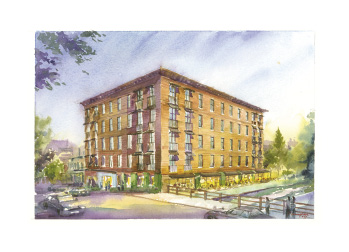- Home
- Media Kit
- Current Issue
- Past Issues
- Ad Specs-Submission
- Ad Print Settings
- Reprints (PDF)
- Photo Specifications (PDF)
- Contact Us

![]()
ONLINE

Creating a Culture
Editors’ Note
In 2002, Horst Schulze formed West Paces Hotel Group, renamed the Capella Hotel Group in 2011. Prior to that, he served as Vice Chairman of The Ritz-Carlton Hotel Company, after serving as President and COO. He had joined Ritz-Carlton as a charter member and VP of Operations in 1983. He was appointed EVP in 1987 and President and COO in 1988. He spent nine years with Hyatt Hotels Corporation, where he was a hotel GM, regional VP, and corporate VP. Before his association with Hyatt, he worked for Hilton Hotels. In 1995, Schulze was awarded the Ishikawa Medal for his personal contributions to the quality movement. In 1999, Johnson & Wales University recognized him with an honorary Doctor of Business Administration degree in Hospitality Management.
Company Brief
Capella Hotel Group (www.capellahotelgroup.com; CHG) provides higher levels of guest satisfaction, guest retention, employee satisfaction, and, ultimately, financial rewards for their owners and investors by delivering superior levels of service excellence for every luxury hotel, spa, and residence they manage. The company offers hospitality management services within four distinct profiles: Capella Hotels; Solís Hotels; Independent Hotels; and Spas, including their own destination spa brand, Auriga.
How did you determine what the Capella brand should stand for?
When I started Ritz-Carlton, I had just come from another hotel company that often talked about what used to be. I didn’t want that to happen again, so I said, let’s start with defining who we are, then describe that in clear wording and make sure that wording is something everyone understands and embraces, so we can be passionate about what we are, not what we used to be.
That definition may have to evolve somewhat because you create a culture in your organization in order to serve a market. If that market changes, you better change with it. That’s why we continue to study and evolve.
Our vision doesn’t change and our values don’t change, but the feel of what we want to be relative to the customer has to change with the customer. So the culture does evolve.
When we started Ritz-Carlton, we knew that if people had to wait longer than five minutes to check in, they would get annoyed. So we offered them a complimentary drink to help pass the time.
Today, waiting even 30 seconds is not okay. The intensity of attitude has changed so the culture has to evolve to adapt to it.

Capella Ixtapa
In creating a new product, how important is culture?
Culture eats strategy for breakfast. Culture creates the sense, the feel, the heart, and the soul of an organization; strategy creates processes that have to exist and you work them within a culture.
The culture is the beliefs of the organization, not the statement that talks about how their most important asset is their employees; it’s a belief in the heart and soul of leadership that makes certain that culture permeates the organization.
You have to make sure your organization is aligned with those beliefs and not behind the strategy only.
How do you maintain the personal side of the relationship in today’s hyperkinetic society?
The relationship with the guests has become much more difficult. For instance, in the past, the bellman or manager would take a guest up in the elevator. That practice has changed so we have to be more focused on creating the relationship elsewhere.
The personal assistant or concierge desk belongs at the front of the property but I moved it to the back, because so many e-mails from customers come in that these employees are constantly looking down at their computers so they are not connecting with guests. I’m adamant that within 9 to 12 feet, no matter what, an employee has to look a guest in the eye and say hello. Therefore, I’d rather move some people to the back to work just on e-mails and leave employees in the front solely to greet guests.
The guest is not seeking an intimate relationship with staff. Our role in the business is to help guests connect with each other, not with us, unless the guest initiates it.

A watercolor of Capella Georgetown
Has the GM role become more focused on business and less on hospitality?
It is a business, but our product is welcoming you, serving you, and enhancing your stay. So if I care for my guest better than my competition, I have a better product, which creates better profits.
It’s not about assets – the building doesn’t even belong to us. We have to concentrate on what we do and through that service, earn money.
Has the word “luxury” lost its meaning?
The true meaning of luxury has changed. In the mind of today’s high-end customer, it is about individualization and personalization; it used to be about marble and chandeliers.
The father of today’s guest who checked into a Ritz-Carlton 30 years ago arrived in a suit and his demands were limited. His son checks in in blue jeans. He also wants good surroundings, but his demands are greater. He wants to be made to feel important.
If you haven’t perfected the art of delivering that personalized and individualized service, you’re just another hotel.
Can schools do a better job teaching this business or must the bulk of the learning be hands-on?
Each of our department heads is a teacher, so when the interns or new employees come in, the department teaches them; we transfer our product – customer service – to the students. That is where colleges fail; they’re teaching students about food costs and margins and yield, which they need to know, but they should also know our product, customer service.
The way I define it is that service starts the second you make contact with the guest.
Can you teach the ability to serve or is it inherent in the individual?
To achieve that service mentality with your staff, you need several processes in place backed by the right culture. The culture creates the feel but staff also needs process to make sure it happens all the time.
Our approach incorporates a thorough orientation to the culture from the first day and then teaches the processes.
How did you become such an innovator in this industry?
I have done what everyone else has done, but I have been relentless in working to understand what the customer wants.
Fifty years ago, you told employees what to do; today, you tell them what the objective is. You once told housekeepers to clean something; you now tell them that it has to be clean because they are here to help encourage guests to come back.
People cannot relate to orders and direction; people relate to motive and objective.•